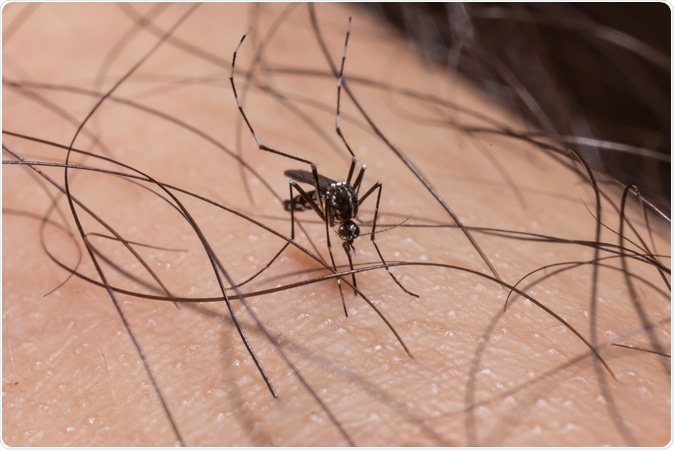The Dengue virus has been difficult to control in the Philippines, and the country has been attempting to immunize its children with the new dengue vaccine Dengvaxia since January 2016.
Sanofi Pasteur, a division of French drug firm Sanofi, last month withdrew its experimental dengue vaccine Dengvaxia citing cases where the vaccine could actually increase the severity of the dengue infection and its complications in persons who received the vaccine and had never had dengue before. So after two years, the program for immunizing the kids against dengue has hit a roadblock.

Mosquito on human skin and sucking blood. Image Credit: Everything I Do / Shutterstock
Philippines Department of Health (DOH) advisory body of doctors and pharmacologists - the Formulary Executive Council (FEC) of advisers had formulated a set of recommendations at the beginning of the program. These were not accepted and the program went ahead with vaccinating 830,000 children. They had cautioned in their recommendations that the safety and cost effectiveness of the vaccine was not yet established and it should be handled carefully. There were three meetings in January where the panel had repeatedly advised caution before finally approving the purchase of the vaccine on 1st February 2016.
The letter from FEC to Garin says, “Based on the available scientific evidence presented to the Council, there is still a need to establish long-term safety, effectiveness and cost-effectiveness,” according to Reuters. They had added that there should be smaller clinical studies and pilot trials and implantation of the vaccination drive in phases to check for the effectiveness and safety of the vaccine. Instead the vaccination drive had rolled out in a single thrust across three regions at the same time. A small baseline study was indeed conducted in February March 2016 but the results were not conclusive.
The panel had also advised against purchasing in bulk to reduce its existing prices and improve upon the cost effectiveness of the vaccine. The minutes of the meeting revealed that the panel had advised that the cost of 1,000 pesos ($21.29) per dose was “not cost-effective” when the buyer was the public. These recommendations were not heeded to at the time and 3 million doses of Dengvaxia in one lot were purchased at the time to ensure that all the kids received three doses of the vaccine.
Dengue is caused by a virus carried by Aedes mosquitoes. It is a febrile illness leading to intense fever and muscle and joint pain. The infection is feared because of the complications it can cause including hemorrhagic fever leading to increased bleeding and death. This infection kills thousands each year in the tropical countries. Philippines last year has seen over 1000 deaths due to dengue and its complications.